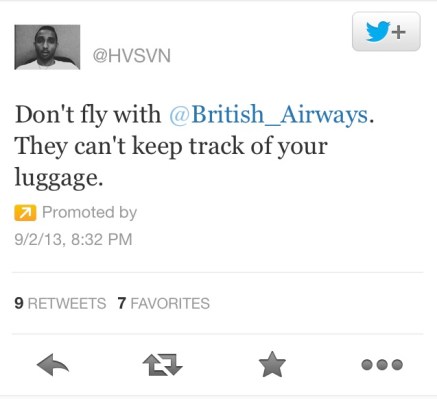Twitter has long been the kvetching board of the Internet, with users constantly complaining about everything from geopolitics to One Direction fans. These gripes typically enjoy a brief, raging moment at the top of followers’ timelines, then fade into obscurity. But one very frustrated consumer just used Twitter as his own personal advertising platform to start an ad-hoc campaign against British Airways.
Hasan Syed, a Chicago-based business owner, bought a promoted tweet Monday night bemoaning the poor customer service his family had received from the airline. Not only did his 400 followers see the tweet but also 50,000 other Twitter users based in New York and the United Kingdom that Syed paid to target.
“I’ve seen complaints about airlines and other services via Twitter all the time,” Syed says. “I thought maybe it might be interesting to see how promoted tweets might work and if that would get anyone’s attention.”
British Airways earned Syed’s vitriol by losing his father’s luggage for two days this weekend after a flight from Chicago to Paris, forcing the man to remain in Paris an extra night and cancel a trip to Dusseldorf, Germany. After calls to the airline’s customer service department got nowhere, Syed’s father asked him to call the airline out online. Many businesses are used to playing damage control with individual irate customers on Twitter—often through direct messages—but Syed decided to broadcast his frustration to a wide audience.
(MORE: Twitter Plans to Become a Shopping Destination)
“Usually with a complaint with an airline, that never happens,” he says. “It’s just a one-on-one thing where they rectify the situation as fast as possible.”
Syed said he’d never heard of an individual turning his personal complaint into a Twitter ad, though he thinks it’s an inevitable use of the platform. Others in the airline industry have already taken notice of Syed’s tactic. Marty St. George, a marketing executive at JetBlue, tweeted that using promoted tweets as a former of consumer complaint could be the start of an emerging trend:
Interesting; a disgruntled customer is buying a promoted tweet slamming a brand where they had a bad experience. That’s a new trend itself!
— Marty St. George (@martysg) September 3, 2013
Perhaps, but only for those consumers that can self-fund an effective advertising campaign. Syed says he spent at least $1,000 on the promoted tweet and tinkered with the users he chose to target carefully. Followers of British Airways received the tweet, as well as followers of news organizations like Mashable and Advertising Age to increase the virality potential of the stunt. It worked—Mashable, which broke the story, has had its article shared more than 10,000 times on social networks.
As for British Airways, the company eventually responded to Syed’s complaints via Twitter, and he says his father now has his luggage once again. “We would like to apologise to the customer for the inconvenience caused,” the airline told The BBC.
While Syed’s one-man ad campaign found success, its implications could prove thorny for Twitter in the future. Advertising on social media platforms is coming under increased scrutiny from the Federal Trade Commission, which released updated guidelines earlier this year for law-abiding marketing in the digital age. Giving anyone with the right amount of cash the ability to distribute an ad across a social network could present problems if people start making false claims.
For now, though, well-funded Twitter snark has managed to force a giant corporation to take notice. “It was borderline trolling,” Syed admits, and some Twitter users called him out for being rude in the way he approached the airline. But he sees positives in the outcome. “It could help keep big businesses more honest, possibly. If they have poor customer service, the repercussions could be far more damaging.”


